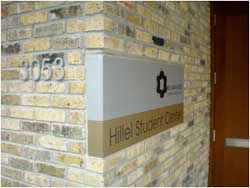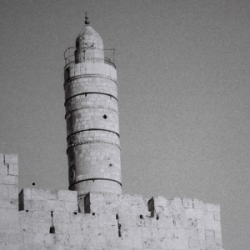 The role of Hillel: The Foundation for Jewish Campus Life has also undergone a transformation. Ten years ago, Hillel activities generally consisted of Friday night prayer services followed by an occasional communal dinner. "Previously, [Hillel] was viewed as a synagogue on campus," Brandeis professors Amy L. Sales and Leonard Saxe write in "Particularism in the University: Realities and Opportunities for Jewish Life on Campus" (January 2006). "In recent years, it [has] fought that image, becoming a primarily social and cultural organization."
The role of Hillel: The Foundation for Jewish Campus Life has also undergone a transformation. Ten years ago, Hillel activities generally consisted of Friday night prayer services followed by an occasional communal dinner. "Previously, [Hillel] was viewed as a synagogue on campus," Brandeis professors Amy L. Sales and Leonard Saxe write in "Particularism in the University: Realities and Opportunities for Jewish Life on Campus" (January 2006). "In recent years, it [has] fought that image, becoming a primarily social and cultural organization."
Nowadays, Hillel understands that Jewish engagement, as one campus Hillel director puts it, is "about the potpourri." Campus Hillels publish Jewish-oriented journals, organize Birthright Israel and community service trips, and host Israeli film festivals, pizza parties, and softball games, among other programs. Rachel Bookstein, director of "Beach Hillel" at California State University, Long Beach, explains that engaging students "is really about helping them determine where they are on the Jewish continuum, where they want to go, and how to help them get there. We have no planned endpoint, except for them to take control of their own Jewish identity."
At the University of Washington Hillel, Rabbi William Berkowitz has created the weekly "Conscious Community" salons -- supportive environments in which Jewish undergraduates and grad students can openly grapple with any ambivalent feelings they may have about their Jewish identities, the Middle East conflict, and other issues. "I'm coming back to Jewish study with my more grown-up brain," says "Conscious Community" participant Dave Kamer, a thirty-year-old University of Washington med student. "Medical school is this loaded experience. Every day you're facing life and death. I find myself wrestling with things, and get to do it in a Jewish context."
The Students -- Meet the "Millennials"
Today's Jewish students are also different from their counterparts of years ago.
Attending college at a time when cultural, ethnic, and religious differences are celebrated and quotas obsolete, these hyper-communicative college students -- the Millennials -- are far less likely than their parents to define their Jewish identities in reaction to anti-Semitism and far more likely to publicly acknowledge their Jewishness. "It's much more common to see college students wearing yarmulkes, and outwardly displaying other Jewish symbols," says Jewish-American historian Professor Jonathan Sarna. "Like other cultural groups, there's been a coming out."
The Millennials are also the most activist generation of college students since the Boomers who marched on behalf of civil rights and against the Vietnam War. "From Darfur to campus janitors," says Wayne Firestone, the incoming national president of Hillel, "this generation of Jewish students is showing a greater concern for what's happening to the other" -- organizing rallies to bring world attention to the atrocities in Darfur and demonstrating solidarity with campus maintenance workers seeking better compensation packages. Some 1,000 Jewish students joined this past year's Hillel-sponsored relief missions to the hurricane-ravaged Gulf Coast, where they cleared debris and repaired roofs. "Many of these students feel passionate about being Jewish but aren't necessarily religious," says Cindy Greenberg, director of NYU's Edgar M. Bronfman Center for Jewish Student Life. "[Jewish-led social action] allows them to express themselves Jewishly in ways they can feel really proud of."
The Middle East Conflict - New Issues, New Solutions
At the onset of the second intifada in 2000, a war of words mirroring the Arab-Israeli conflict engulfed many American college campuses. Pro-Palestinian groups hosted conferences denouncing Zionism, aggressively campaigned in favor of Israel divestment, and staged demonstrations - in some cases erecting replicas of Israel's security barrier, which they referred to as "The Apartheid Wall."
It wasn't the first time that the Middle East conflict had made its way to campus. After Israel's Six-Day War victory in 1967, many campus radicals who opposed the Vietnam War embraced the Palestinian cause. This created a quandary for some left-leaning Jewish students, says Professor Sarna. In some circles, being "a good liberal meant opposing Israel, because Israel was thought to be imperialist."
The Middle East conflict a generation later has, however, been markedly different. Then, Israel's occupation and settlement of the West Bank and Gaza was being debated. Today, the issue is Israel's very right to exist as a Jewish state. "It has not been a matter of discussing policy," Professor Sarna says, "[but] about analogizing Israel to South Africa, to an apartheid state that must be dismantled."




